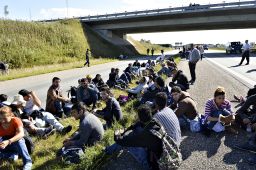Story highlights
NEW: Obama unveils effort to admit 10,000 refugees next year, up from 1,500 this year
Danish police say they won't detain migrants and refugees trying to travel onward to Sweden
EU states are under pressure to agree to binding quotas on refugees, most of them fleeing Syria
Faced by throngs of refugees seeking to travel through Denmark to reach Sweden – part of a wave of migrants putting Europe’s migration system to the test – Danish police have said they will allow them to move freely.
Many of the migrants who have reached Denmark want to get to Sweden because it is seen as giving refugees a warmer welcome.
Danish National Police Chief Jens Henrik Hoejbjerg said Thursday that the police alone had made the decision to allow migrants and refugees to continue their travels, in accordance with Danish and international rules of law.
Danish Prime Minister Lars Loekke Rasmussen later said the police had his government’s full support in their handling of the situation. It comes a day after Danish authorities temporarily blocked some roads and rail links in a bid to limit the number of migrants crossing into Denmark.
Denmark’s shift in approach comes as EU nations scramble to deal with a massive influx of migrants – many of them fleeing Middle East conflict – the likes of which has not been seen for decades.
Obama initiates plan to accept more refugees
Meanwhile, U.S. President Barack Obama ordered his administration to “scale up” the number of Syrian refugees to be admitted to the United States, directing his team to prepare for at least 10,000 in the next fiscal year, a spokesman said Thursday.
The announcement comes in the wake of growing questions about the smaller number of Syrians taken in so far. As of last week, 1,557 Syrian refugees have been admitted to the United States since the start of the conflict. The majority of them – 1,199 – were admitted in the 2015 fiscal year, which ends September 30.
Here’s a breakdown: 23 in 2011, 41 in 2012, 45 in 2013, 249 in 2014 and 1,199 so far this fiscal year, which ends September 30, according to the State Department.
About 300 more refugees are expected to be admitted by the end of this fiscal year. This equates to a grand total of about 1,800 refugees from Syria’s four-year civil war being admitted to the United States by October 1, according to U.S. officials.
The proposed resettling of at least 10,000 Syrian refugees would be allocated out of a U.S. quota of 75,000 refugee admissions slated for next fiscal year, beginning October 1, a senior administration official said.
That quota applies to refugees from all over the world and is set at the beginning of the fiscal year, but Obama can raise that quota if there’s a crisis. Secretary of State John Kerry has already indicated to lawmakers that such an increase is in the works.
Who welcomes Syrian refugees, who doesn’t
Proposed quotas for EU
Many of those reaching Denmark will already have made the arduous journey from Turkey to Greece by sea and then overland through the Balkans and Eastern Europe, before passing through Austria and Germany.
On Wednesday, European Commission President Jean-Claude Juncker set out proposals for mandatory quotas for EU states to take in 120,000 refugees who were already in Italy, Greece and Hungary, on top of plans made in May to relocate 40,000 from Italy and Greece.
Those nations are at the forefront of the crisis, thanks to transit routes across the Mediterranean and through the Balkans.
Austria’s national railway company, Osterreichische Bundesbahnen, said Thursday it has suspended train traffic to and from Hungary until further notice because of the massive congestion created by the influx of migrants and that no tickets are being sold.
Meanwhile, the Greek coast guard said almost 4,500 migrants were being taken by ferry Thursday from the island of Lesbos – where authorities have been overwhelmed by the numbers arriving by sea – to the country’s main port, outside Athens.
Jordan’s queen: We need collective action
EU member states must still agree to the European Commission’s proposals. Their interior ministers are due to meet Monday to discuss the issue.
Germany, which has said it expects to receive 800,000 asylum applications this year, has said binding quotas are the only fair way for the 28-nation EU bloc to handle the crisis – but some other members are strongly opposed.
German Vice Chancellor Sigmar Gabriel said Thursday that Germany had already registered 450,000 refugees this year, with more flowing in by the day. Some 37,000 were registered just in the first eight days of September, he said.
Queen Rania of Jordan told CNN’s Becky Anderson that this was no longer just a problem for the Middle East or for Europe.

“This is for the whole international community to deal with and we need to come together for collective action. We need to come up with a comprehensive and cohesive policy in order to deal with this.”
Jordan is host to nearly 630,000 U.N.-registered refugees from neighboring Syria, but estimates that the total number is closer to 1.4 million people who’ve fled the conflict in the last four years.
Europeans need to be reminded that the refugees leaving Syria are not migrants coming to Europe by choice, Rania said.
“A migrant is somebody who chooses to go to another country, they want a better job, education, or to unite their family,” she said. “They can choose to go back to their own country and have protection from their government, whereas refugees are literally running for their lives.”
Prime Minister: Responding ‘in a Danish way’
Hoejbjerg, the Danish police chief, said his officers only had a right to detain migrants who do not wish to seek asylum in Denmark for up to 72 hours – after which time they must be released, unless they can be sent to another country.
When refugees come from war-torn countries, he said, they have no option but to free them.
Hoejbjerg said there had been no prior discussions with his own government or with Sweden before deciding to allow the migrants to move on freely.
Rasmussen, speaking after a meeting with Hoejbjerg and ministers, praised the efforts of his country’s police force.
“They have done a great piece of police work, in which we abide by our international responsibilities – and we are doing it in a Danish way.”
The Danish government has taken steps in recent days to try to stem the flow of migrants, including running Arabic-language advertisements in Lebanese newspapers warning would-be migrants of new, tighter restrictions for those seeking asylum in Denmark.

Since Sunday, about 3,200 migrants have arrived in the country, Rasmussen said, of whom 668 have sought asylum in Denmark. He wondered why there had not been more, but added “we cannot force them to seek asylum.”
Highways linking Denmark with Germany were open as usual on Thursday, a day after some routes were closed off.
Rail routes between Germany and Denmark were also operating fairly normally Thursday, said Martin Larsen, a spokesman for the Danish national rail company, DSB.
Migrant vs. refugee: What’s the difference?
Are countries obligated to take in migrants?
Tougher restrictions
Denmark’s Immigration and Integration Minister Inger Stojberg, an immigration hardliner from the right-wing Venstre party, announced the moves to tighten restrictions on asylum seekers via Facebook on Monday.
Denmark is high on the list for people smugglers helping migrants reach Europe, the minister said.
“I wish to change that because we cannot simply keep up with the present flow,” she said. “In light of the huge influx to Europe these days, there is good reason for us to tighten rules and get that effectively communicated.”
The ads run in Lebanese newspapers state that Denmark has passed a law to reduce social benefits for newly arrived refugees by as much as 50%.
Other measures include ensuring that foreign nationals granted temporary protection in Denmark will not have the right to bring family members to Denmark during the first year; and that they can only be granted a permanent residence permit after a minimum of five years.
To get a permanent residence permit, refugees must also meet certain requirements in terms of learning the Danish language, the advertisement said. Anyone whose asylum request is rejected will be swiftly returned.
Opinion: Europe reaps what it has sown
Journalist Susanne Gargiulo reported from Copenhagen, CNN’s Laura Smith-Spark wrote from London, and Michael Martinez from Los Angeles. CNN’s John Dear, Kim Norgaard, Pierre Meilhan, Chris Liakos, and Tobias Grimm contributed to this report.






